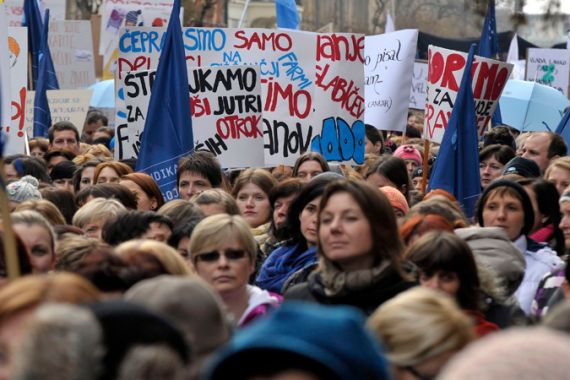Polls loom as party quits Slovenia government
Civic List quit ruling coalition over refusal of PM to resign in corruption scandal, as 100,000 strike over pay cuts.

A junior partner in Slovenia’s ruling coalition has quit, stripping the government of its majority in parliament and pushing the euro zone country closer to a bailout, as some 100,000 public sector employees held a strike over pay cuts.
A second snap election in little over a year looks likely after the party, Civic List, said it had left the ruling coalition over the refusal of conservative prime minister Janez Jansa to resign amidst a corruption scandal.
“Civic List is quitting the coalition,” parliament speaker and party chief Gregor Virant told reporters. “I would also like to reply to the reproach that Civic List is causing a political crisis. The political crisis started on the day when the anti-corruption commission gave its findings, and the first step in resolving the crises is Civic List’s quitting the coalition.”
Jansa can hold on at the helm of a minority government, at least until parliament nominates a new prime minister or calls an early election. He will lose his finance minister, Civic List member Janez Sustersic.
“The minority government can continue for a while, but it seems that sooner or later an early election will be held,” said Borut Hocevar, an analyst at the Slovenian daily Finance. “This crisis is certainly pushing Slovenia towards a bailout.”
Hit by falling demand for its exports, the Alpine country is battling to stabilise its public finances and reassure markets to avoid becoming the latest member of the euro zone to seek an international bailout.
The government bought some time in October when it managed to issue its first bond in 19 months, averting the need for a bailout for around six months.
Public sector strike
Civic List had issued an ultimatum to Jansa to quit or face losing his majority, after an anti-corruption commission issued a report earlier in January saying the prime minister had failed to explain the source of some of his income.
Jansa has denied wrongdoing and says he will not resign.
But two more parties in the five-party ruling coalition government have also threatened to leave in the coming weeks unless a new prime minister is nominated.
The corruption allegations have fuelled public anger over spending cuts and labour reforms. On Wednesday, some 100,000 public sector employees held a strike over pay cuts, while around 14,000 employees in the metals and electronics industries also walked off the job, seeking wage increases of up to 7.5 percent.
State employees are angry about a plan to lay off workers and cut wages by some 5 percent this year, adding to a cut of around 3 percent in 2012 as the government tries to narrow its budget shortfall to around 3 percent of national output from 4.2 percent last year.
The public sector strike closed almost all schools, kindergartens and universities in the country of 2 million people. Hospitals were offering limited care with reduced staff.
Protests over the cuts and corruption allegations have caused regular disruption and sometimes turned violent.